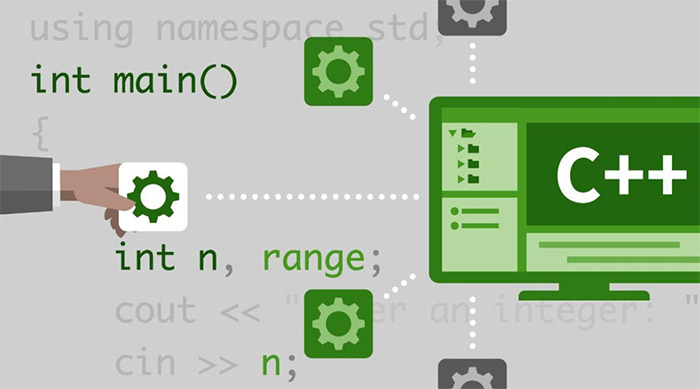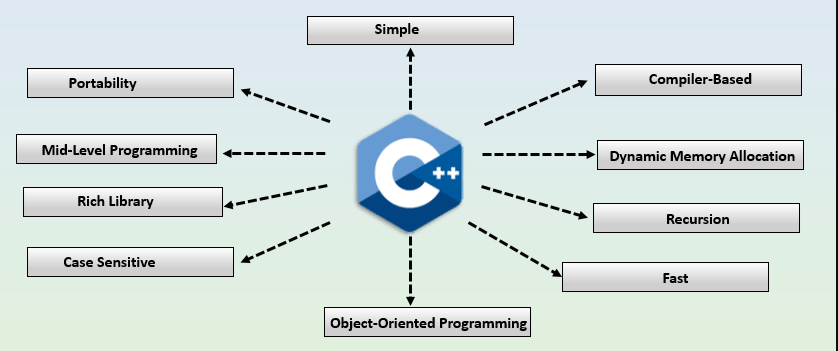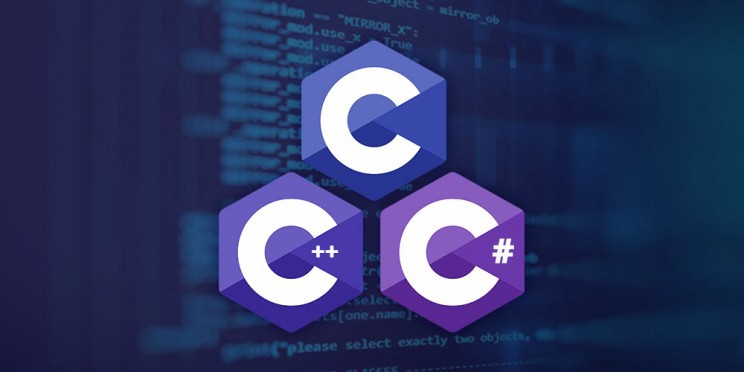Programming languages are the source of all the simple to complex applications you are using on your computer or smartphone.
Since the birth of the first modern programming language, many low- to high-level languages have emerged to make programming more efficient.
And among them, C++ emerges as the perfect choice to effectively tackle many different tasks. So why is C++ a language that attracts so many users?
Let’s find out in the article below!
What is C++?
C++ is a mid-level programming language with an average ability to abstract and apply the natural language. For this reason, we can use it for object-oriented programming, polymorphic programming, or dealing with abstract data types.
In addition, this language also appears in many projects that apply programming techniques. Besides, with the characteristics of a general-purpose language, C++ is also suitable for many software, from simple to complex.

Another unique feature that C++ has is its ability to create an impressive performance and possess high flexibility in operating systems with excellent system resources.
Therefore, this programming language is prevalent in developing drivers for embedded operating systems or handheld game consoles, devices with meager resources.
History of C++
In 1979, 6 years before C++ was born, Bjarne Stroustrup, the father of this language, started working on the concept of classes in programming.
After a long time, he realized that the current other languages are mainly incapable of serving the end purpose of his research.
And from there, in Stroustrup’s mind, came the idea of creating a new programming language.

During his time at Bell Labs, he often encountered problems with Unix kernel analysis and distributed computations. It is also from here that Stroustrup began to apply the experience gained during previous research to solve this complex problem.
And the result was a language called “C with classes,” an excellent combination of two popular programming languages at the time, Simula and C.
In 1983, the concept of “C with classes” officially disappeared and replaced C++, the name we are familiar with today.
In addition to changing the calling method, new functions have also been added to enrich C++. Since then, this programming language has undergone many revisions to better suit new standards and needs.
Applications of C++

Games
C++ is used a lot in handling 3D animations and designing resource management operating systems for fun. Also, game engines are very much related to C++.
Application with user interface (GUI)
The ability to program the graphical user interfaces allows C++ users to use this general purpose programming language to make window frames more beautiful and easy to use.
Web browser
Web browsers benefit greatly from C++’s impressive performance and resource management capabilities.
Calculation and graphics applications
C++ can implement simulations that require real-time related elements such as 3D simulation and high-performance image processing.
Operating system
The combination of performance, speed, and deep-rooted accessibility make C++ the number one choice for functional embedded systems developers.
Advantages and Disadvantages of C++

Pros
1. Performance and speed
The most significant advantage of the operating systems lies in the fact that this programming languages possess exceptionally high performance and speed. A few “ms” or “kb” differences won’t be too much of a problem with today’s modern devices.
But if you look at devices with limited memory or large data centers like servers, that much deviation can create a disaster. So new programmers must take advantage of C++’s impressive optimization capabilities.
Not only that, but this programming languages also provides users with the ability to customize a performance to save energy.
2. C++ Library
The C++ standard library inherits many details from its C predecessor and essential additions to optimize performance. So if you are familiar with C, using C++ will become simpler.
But more importantly, the leading experts in the field of computers have already standardized the standard library of the C programming languages.
So we can freely use it without worrying too much about having to rewrite parts or the whole library ourselves.
3. Introductory Functions in C++
C++ offers users more robust features than C or other middle-level languages.
We can mention some prominent names such as declaration as clause, function-like conversion, new/delete, inline, default argument, function overloading.
4. Multi-model
C++ has the unique features of C and has the polymorphism of Simula, the world’s first object-oriented programming languages.
So we can use concepts like polymorphism, encapsulation, inheritance, and abstraction with C++ to implement OOP-oriented programming projects.
5. Versatile
Characterized by a mid-level language, C++ can perform tasks of both high and low levels. So you will see programmers using this object oriented programming language for a lot of work, from making games, processing graphics, creating operating systems, and controlling embedded hardware.
Cons
1. Use of Pointers
Pointers are characteristic of C languages, including C and C++. Although it helps us manipulate faster and easier, this feature is quite tricky to use and easy to cause errors if you do not know how to control it.
2. Security Issue
Object-oriented other programming languages like C++ is always a safety issue for programmers.
With the enormous scope of friend functions, global variables, and pointers, the chances are high that you will inadvertently leak the source code of your software.
Similarities & Differences Between C, C++ and C#
There are some significant similarities between C, C++, and C#, such as memory management, libraries, and some declarative data structures. In addition, the most noticeable feature in all 3 is the appearance of the concept of “pointer.”

Besides the similarities, these three languages also possess distinct differences. The most significant is that we cannot use the OOP concept in C, but it is straightforward to realize objects with C++ or C#.
Besides, the rank of each object oriented programming language is also the most apparent difference. If C is a low-level language to simplify contact with hardware, C++ is a middle-level programming language with the ability to handle many tasks well.
And finally, C#, a high-level object oriented programming language with many modern features that makes object oriented programming more accessible.
Conclusion
Although there are still some limitations, there is no denying that C++ is indeed a powerful c programming language and suitable for use in many different situations.
If you have any further questions, please leave a comment below so that we can promptly respond. Thank you for following this post!
